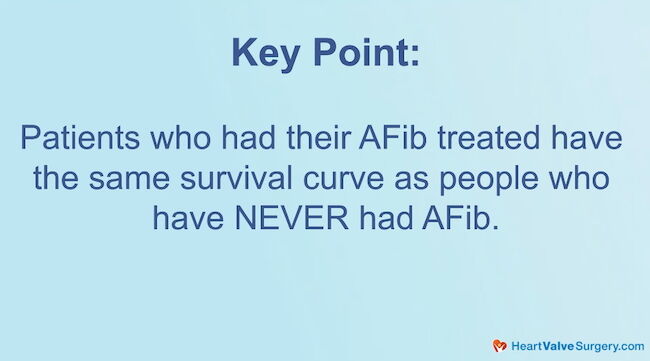Treating Atrial Fibrillation with Surgical and Transcatheter Mitral Valve Repair
Written By: Allison DeMajistre, BSN, RN, CCRN
Medical Expert: Mark Gerdisch, MD, Chief of Cardiac Surgery, Franciscan Health, Indianapolis, Indiana
Reviewed By: Adam Pick, Patient Advocate, Author & Website Founder
Published: May 15, 2025
Atrial fibrillation (AFib) and mitral valve regurgitation are often interconnected. Mitral regurgitation occurs when the valve doesn’t close properly, allowing blood to leak backward into the left atrium. Over time the backflow of blood causes pressure in the atrium to increase, which causes the atrial walls to stretch and enlarge. Eventually, the atrial enlargement disrupts the heart’s electrical system, making AFib more likely. Once a patient is diagnosed with AFib, it’s imperative to get treatment for the irregular heartbeat to prevent a stroke.
We recently received a great patient question on this important topic from Rob, who asked, “I’m researching treatment options for mitral regurgitation. I also have atrial fibrillation. Do both approaches, surgery and transcatheter, have the same impact on my AFib?”
To answer Rob’s question, we met with Dr. Marc Gerdisch, the Chief of Cardiac Surgery at Franciscan Health in Indianapolis, Indiana. So you know, Dr. Gerdisch has performed over 7,000 cardiac surgeries, with more than 5,000 involving heart valve procedures. In our community, Dr. Gerdisch has successfully treated more than 100 patients with excellent outcomes.
About Atrial Fibrillation, Surgical & Transcatheter Mitral Valve Repair
Here are the key insights shared by Dr. Gerdisch:
- Should the AFib be treated with a transcatheter mitral valve repair? “This is a great question because it goes to a couple of issues and one we’re solving right now with a randomized controlled study,” said Dr. Gerdisch. “The fundamental question is whether a person should have a transcatheter intervention for their mitral regurgitation because the atrial fibrillation should be treated.”
- Intervention depends on the patient and if they can tolerate surgery. “If a person has paroxysmal atrial fibrillation, could they have a transcatheter mitral valve repair, and then a transcatheter intervention for their AFib, and a transcatheter intervention for their appendage? They could, but it might not make sense, and the outcome won’t be as good,” said Dr. Gerdisch.
- Changes in valve structure impact atrial fibrillation. Dr. Gerdisch explained that with degenerative mitral valve disease, there are changes in the actual structure of the valve from a significantly leaky valve, which causes distention of the atrium and, ultimately, AFib.
- Transcatheter mitral valve repair (TMVR) is not approved for degenerative regurgitation. “If it’s myxomatous degenerative disease, the percutaneous technology doesn’t have clearance for that. They have clearance for patients at extreme risk or considered too high risk for surgery. In degenerative disease, that is a very rare thing. We’ll do minimally invasive mitral valve repair on a 94-year-old patient, and they go back to riding their bike. It’s not that surgery can’t be done. It’s just a matter of the overall risk stratification. I suspect that Rob probably is fairly robust and probably can have heart surgery. Most likely, the indication will only be there for heart surgery.”

- Addressing AFib leads to better outcomes. “The good news is that the AFib can and should be treated,” said Dr. Gerdisch. “It becomes important because we know that survival is better for folks that have ablation. It’s best if they have a successful ablation. So much so that in the Northwestern data, we saw several years ago that if you took patients who did or did not have their AFib treated, the folks who did have it treated had the same survival curve as people who never had atrial fibrillation. Whereas the people who had AFib left untreated didn’t do as well.”

- A patient case study with a similar presentation. “This morning, we presented a video abstract of a patient who had received a MitraClip at another institution, and the clip did not work out well. He had a very sick heart. He’s a very sick person, but we had to address the continued leak from his mitral valve. We removed the MitraClip that had been in for two years and repaired his mitral valve. He also had severe tricuspid insufficiency, and we repaired that. Then he also had AFib for over a decade, and we addressed that successfully. Now, he’s in sinus rhythm, both valves work, his ventricles are recovering, he’s not as sick as he used to be, and he’s living a good life. It’s important that people understand these multivalve scenarios, and when accompanied by AFib, their entirety should be treated.”
- Gerdisch’s final assessment. “To answer the question, the valve will most likely be successfully treated with surgery if it’s myxomatous. Secondly, atrial fibrillation absolutely should be addressed because it affects survivability over time.”
Thanks Dr. Gerdisch and the Franciscan Health!
On behalf of all the patients in our community, thank you, Dr. Mark Gerdisch, for everything you and your team are doing at Franciscan Health in Indianapolis, Indiana!
Related links:
- See Dr. Mark Gerdisch’s Interactive Surgeon Profile
- Atrial Fibrillation: A Concern for Heart Valve Patients?
- Surgeon Q&A: Minimally-Invasive Mitral Valve Repair with Dr. Gerdisch
Keep on tickin,
Adam
Video Transcript:
Adam Pick: Hi everybody, it’s Adam with HeartValveSurgery.com and we’re in Los Angeles, California at the Society of Thoracic Surgeons Conference. I am thrilled to be joined by Dr. Mark Gerdisch who’s the Chief of Cardiac Surgery at Franciscan Health in Indianapolis, Indiana.
Dr Gerdisch, you and I have known each other for over 10 years. You have successfully treated over 100 patients in our community here at STS. And as always, it is great to see you. Thanks for being with me today.
Dr. Marc Gerdisch: Thank you, Adam.
Adam Pick: We’re answering patient questions that are coming in from all over the world. This question is from Rob and he asks, “I’m researching treatment options for mitral regurgitation. I also have atrial fibrillation. Do both approaches, surgery and transcatheter, have the same impact on my AFib?”
Dr. Marc Gerdisch: This is a great question because it goes to a couple of issues and even one that we’re solving right now there’s a in a randomized controlled study, but fundamentally the question is whether a person should have a transcatheter intervention for their mitral regurgitation or not… Because the atrial fibrillation should be treated.
Now, if that person has paroxysmal atrial fibrillation, could they have a transcatheter mitral valve repair, and then a transcatheter intervention for their AFib, and a transcatheter intervention for their appendage? That is all true, but it might not make sense, and the outcome isn’t going to be quite as good, quite honestly.
The reason I say that is because degenerative disease for mitral valves, which is probably what we’re talking about. Degenerative disease meaning that there are changes in the actual structure of the valve and usually those are the folks who get atrial fibrillation because the leak is big and it causes distention of the atrium and they get atrial fibrillation.
If it’s myxomatous degenerative disease, the percutaneous technology actually doesn’t have a clearance for that. They have a clearance for patients who are extreme risk or considered too high risk for surgery. So, in degenerative disease, that’s a very rare thing. As you know, I mean, we’ll do minimally invasive mitral valve repair on a 94-year-old patient and they go back to riding their bike.
It’s not that that surgery can be done. It’s just a matter of kind of the overall risk stratification. My suspicion is that Rob probably is, you know, fairly robust and probably can have heart surgery. Most likely, the indication is only going to be there for heart surgery.
The good news is that the atrial fibrillation can and should be treated. And it becomes very important because we know that survival is better for folks that have ablation. It’s best if they have ablation that’s successful. So much so, that in the Northwestern data, we saw several years ago that if you took patients who did or did not have their AFib treated, the folks who did have their AFib treated had the same survival curve as people who never had atrial fibrillation. Whereas, the people who had atrial fibrillation left untreated didn’t do as well.
In fact, this morning, we presented a video or video abstract of a patient who had received a MitraClip at another institution and the clip had not worked out well. He had a very sick heart. He’s a very sick person. But, we had to address his continued leak from his mitral valve.
We actually removed the MitraClip and it had been in for two years, re-repaired his mitral valve, or repaired his mitral valve. He also had severe tricuspid insufficiency, and we repaired the tricuspid insufficiency. And then he had atrial fibrillation for over a decade, which we also addressed successfully.
So now he’s in sinus rhythm, both of his valves work, his ventricles are covering, he’s not as sick as he used to be, he’s living a good life. It’s important that people understand in the context of these multivalve scenarios and in, when accompanied by atrial the entirety of it should be treated.
To answer the question, the valve is most likely going to be successfully treated if it’s myxomatous with a surgery. And secondly, the atrial fibrillation absolutely should be addressed because it goes to survivability over time.
Adam Pick. Great. Well, Rob, I hope that helped you. It helped me, Dr. Gerdisch. It’s helping patients all over the world, and on behalf of them, thanks for everything that you and your team are doing at Franciscan Health in Indianapolis, Indiana. Thanks for being with me today.
Dr. Marc Gerdisch: Thanks, Adam.





